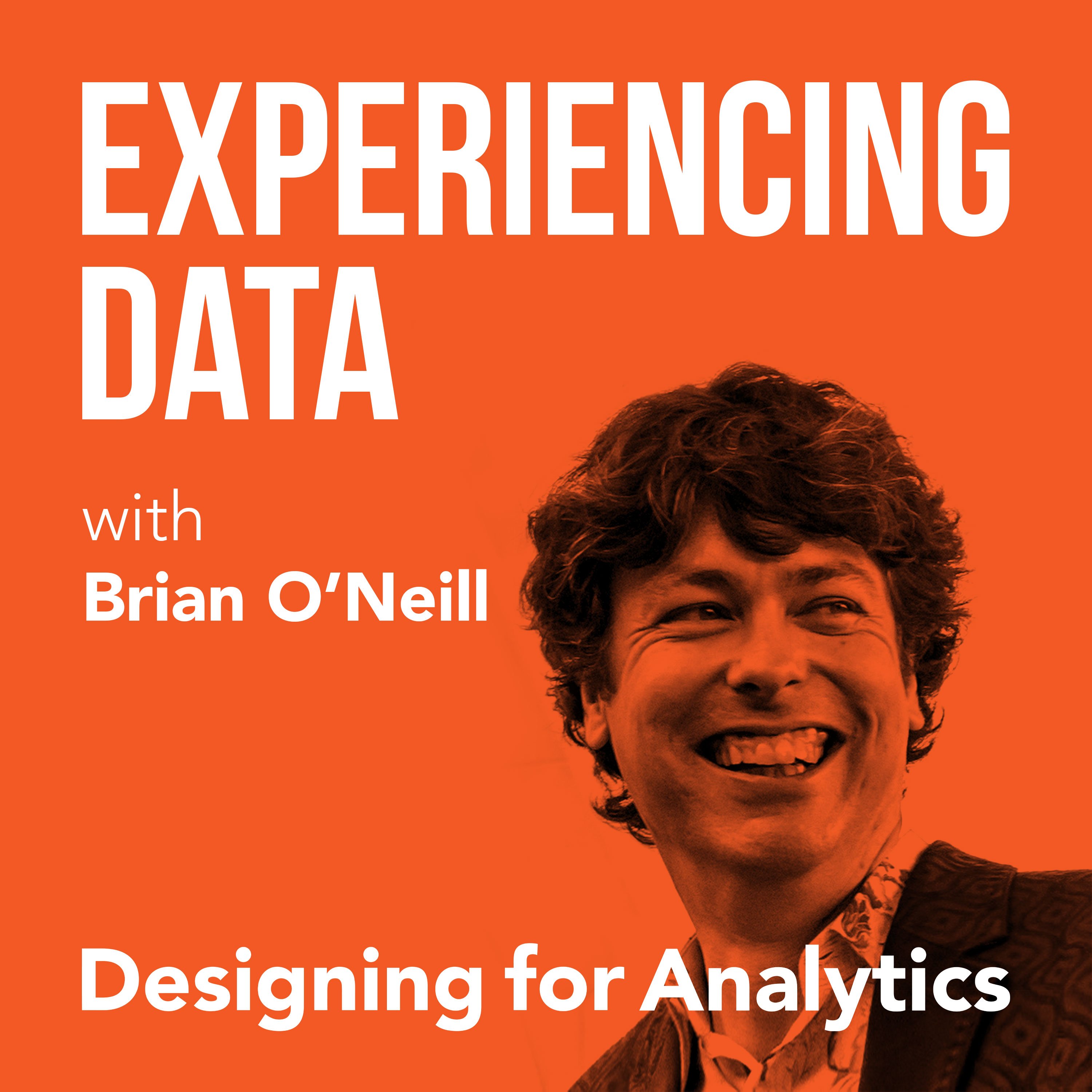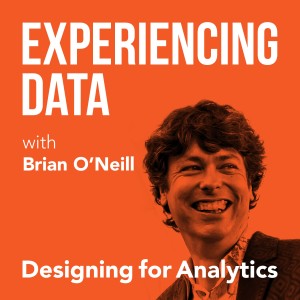

154.8K
Downloads
185
Episodes
Is the value of your enterprise analytics SAAS or AI product not obvious through it’s UI/UX? Got the data and ML models right...but user adoption of your dashboards and UI isn’t what you hoped it would be?
While it is easier than ever to create AI and analytics solutions from a technology perspective, do you find as a founder or product leader that getting users to use and buyers to buy seems harder than it should be?
If you lead an internal enterprise data team, have you heard that a ”data product” approach can help—but you’re concerned it’s all hype?
My name is Brian T. O’Neill, and on Experiencing Data—one of the top 2% of podcasts in the world—I share the stories of leaders who are leveraging product and UX design to make SAAS analytics, AI applications, and internal data products indispensable to their customers. After all, you can’t create business value with data if the humans in the loop can’t or won’t use your solutions.
Every 2 weeks, I release interviews with experts and impressive people I’ve met who are doing interesting work at the intersection of enterprise software product management, UX design, AI and analytics—work that you need to hear about and from whom I hope you can borrow strategies.
I also occasionally record solo episodes on applying UI/UX design strategies to data products—so you and your team can unlock financial value by making your users’ and customers’ lives better.
Hashtag: #ExperiencingData.
JOIN MY INSIGHTS LIST FOR 1-PAGE EPISODE SUMMARIES, TRANSCRIPTS, AND FREE UX STRATEGY TIPS
https://designingforanalytics.com/ed
ABOUT THE HOST, BRIAN T. O’NEILL:
https://designingforanalytics.com/bio/
Episodes

Tuesday Dec 13, 2022
Tuesday Dec 13, 2022
Today I’m chatting with former-analyst-turned-design-educator Jeremy Utley of the Stanford d.school and co-author of Ideaflow. Jeremy reveals the psychology behind great innovation, and the importance of creating psychological safety for a team to generate what they may view as bad ideas. Jeremy speaks to the critical collision of unrelated frames of reference when problem-solving, as well as why creativity is actually more of a numbers game than awaiting that singular stroke of genius. Listen as Jeremy gives real-world examples of how to practice and measure (!) your innovation efforts and apply them to data products.
Highlights/ Skip to:
- Jeremy explains the methodology of thinking he’s adopted after moving from highly analytical roles to the role he’s in now (01:38)
- The approach Jeremy takes to the existential challenge of balancing innovation with efficiency (03:54)
- Brian shares a story of a creative breakthrough he had recently and Jeremy uses that to highlight how innovation often comes in a way contrary to normalcy and professionalism (09:37)
- Why Jeremy feels innovation and creativity demand multiple attempts at finding solutions (16:13)
- How to take a innovation-forward approach like the ones Jeremy has described when working on internal tool development (19:33)
- Jeremy’s advice for accelerating working through bad ideas to get to the good ideas (25:18)
- The approach Jeremy takes to generate a large volume of ideas, rather than focusing only on “good” ideas, including a real-life example (31:54)
- Jeremy’s beliefs on the importance of creating psychological safety to promote innovation and creative problem-solving (35:11)
Quotes from Today’s Episode
- “I’m in spreadsheets every day to this day, but I recognize that there’s a time and place when that’s the tool that’s needed, and then specifically, there’s a time and a place where that’s not going to help me and the answer is not going to be found in the spreadsheet.” – Jeremy Utley (03:13)
- “There’s the question of, ‘Are we doing it right?’ And then there’s a different question, which is, ‘Are we doing the right “it”?’ And I think a lot of us tend to fixate on, ‘Are we doing it right?’ And we have an ability to perfectly optimize that what should not be done.” – Jeremy Utley (05:05)
- “I think a vendetta that I have is against this wrong placement of—this exaltation of efficiency is the end-all, be-all. Innovation is not efficient. And the question is not how can I be efficient. It’s what is effective. And effectiveness, oftentimes when it comes to innovation and breaking through, doesn’t feel efficient.” – Jeremy Utley (09:17)
- “The way the brain works, we actually understand it. The way breakthroughs work we actually understand them. The difficulty is it challenges our definitions of efficiency and professionalism and all of these things.” – Jeremy Utley (15:13)
- “What’s the a priori probability that any solution is the right solution? Or any idea is a good idea? It’s exceptionally low. You have to be exceptionally arrogant to think that most of your ideas are good. They’re not. That’s fine, we don’t mind because then what’s efficient is actually to generate a lot.” – Jeremy Utley (26:20)
- “If you don’t learn that nothing happens when the ball hits the floor, you can never learn how to juggle. And to me, it’s a really good metaphor. The teams that don’t learn nothing happens when they have a bad idea. Literally, the world does not end. They don’t get fired. They don’t get ridiculed. Now, if they do get fired or ridiculed, that’s a leadership problem.” – Jeremy Utley (35:59)
- [The following] is an essential question for a team leader to ask. Do people on my team have the freedom, at least with me, to share what they truly fear could be an incredibly stupid idea?” – Jeremy Utley (41:52)
Links
- Ideaflow: https://www.amazon.com/Ideaflow-Only-Business-Metric-Matters-ebook/dp/B09R6M3292
- Ideaflow website: https://ideaflow.design
- Personal webpage: https://jeremyutley.design
- LinkedIn: https://www.linkedin.com/in/jeremyutley/
- Twitter: https://twitter.com/jeremyutley/
- Brian’s musical arrangement of Gershwin’s “Prelude for Piano IIfeaturing the Siamese Cat Song” performed by Mr. Ho’s Orchestrotica - listen on Spotify
No comments yet. Be the first to say something!